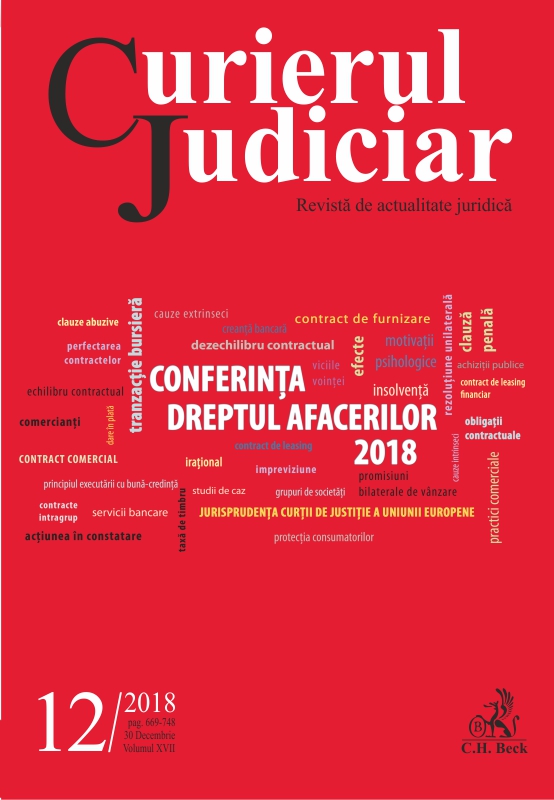Efectele insolvenței utilizatorului asupra contractului de leasing
The effects of the opening of user insolvency onto financial lease agreement
Author(s): Ramona-Florentina AndrițoiuSubject(s): Law, Constitution, Jurisprudence, Commercial Law
Published by: C.H. Beck Publishing House - Romania
Keywords: opening of insolvency proceedings; financial lease agreement; insolvent user; interest of the financier; ongoing contract; denunciation of the contract; maintenance of the contract;
Summary/Abstract: Law no. 85/2014 attempts to eliminate or at least reduce the chaos created around the insolvent debtor once the insolvency procedure starts; and establishes rules to protect the debtor's contractual partners, economic security and therefore business relations, which are vital functions of the economic environment. In general, the insolvency procedure establishes derogatory rules from the general regulations in order to protect the commercial contract or to terminate it in case it does not present an interest in the recovery of the debtor or in case the execution of the contract does not present economic value. In the judicial doctrine , it was metaphorically noted that the state of insolvency, „is nothing but the beginning of a procedure made up of paradoxes and filled with defiance of the principles of law, which seemed to last for eternity. Thus, contracts which used to have a force equal to the law are now easily torn down and become malleable in the debtor's interest”. The present paper aims at analysing to what extent the debtor's insolvency condition affects the financial leasing contract concluded by the debtor before the insolvency procedure started. How malleable this contract becomes in light of the new regulation and how much is the interest of the insolvent debtor or the interest of the financier protected? The main issues that this paper proposes to address can be structured as follows: I. The financial Lease Contract vs. the insolvency of the user under the old regulation. What does Law no. 85/2014 bring new in respect to the financial lease contract? II. A brief exposition of how practitioners in the field have understood to interpret and apply the provisions of Art. 123 par. (11) and (12) of Law 85/2014. III. Effects of the contract termination notice sent by the financier in reference to the judicial administrator's refusal to take notice of such termination. IV. The fate of the assets involved in the financial lease. V. Limits and conditions under which the financier's action based on the provisions of Art. 123 par. (4) of Law no. 85/2014 can be admitted. VI. The conditions under which the financier could make use of the provisions of Art. 123 par. (11) of Law no. 85/2014. Art. 123 of Law no. 85/2014 intends to set the fate of the contracts in progress within a predetermined period (3 months from the opening of insolvency proceedings against the debtor). As a general conclusion, we can assume that there is a need for a thorough analysis of the contractual relations of the debtor fallen into insolvency, after which analysis he will reconfigure the business system in which the debtor will operate. At first reading the text of art. 123 of Law no. 85/2014 it may be considered that the problems arising under the previous regulation in connection with the execution and termination of the financial leasing contract have been resolved. But is that so? The main observation that should be made is that the intention of the legislator was to distinguish between the two ways of terminating the lease in the time of insolvency, namely: termination and denunciation. The two do not overlap and produce distinct effects on the finance lease, as we shall demonstrate in this paper.
Journal: Curierul judiciar
- Issue Year: 2018
- Issue No: 12
- Page Range: 695-699
- Page Count: 5
- Language: Romanian
- Content File-PDF

